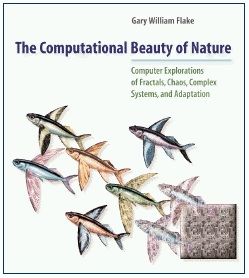

by Gary William Flake
by Melanie Mitchell
This course will explore the concepts of emergence and complexity within natural and artificial systems. Simple computational rules interacting in complex, nonlinear ways can produce rich and unexpected patterns of behavior, and may account for much of what we think of as beautiful or interesting in the world. Taking this as our theme, we will investigate a multitude of topics including fractals and the Mandelbrot set; chaos theory and strange attractors; cellular automata such as Wolfram's elementary automata and Conway's Game of Life; self-organizing and emergent systems; formal models of computation such as Turing machines; artificial neural networks; genetic algorithms; and artificial life. The central questions motivating our study will be: How does complexity arise in Nature? Can complexity be quantified and objectively measured? Can we capture the patterns of Nature as computational rules in a computer program? What is the essence of computation, and what are its limits? Throughout the course, we will emphasize mathematical concepts and computer experimentation rather than programming, using the computer as a laboratory in which to design and run simulations of complex systems and observe their behaviors.
Open to any interested student.
Prof. Jim Marshall
Office: Ilchman Science Center 100
Phone: 2673 (from off campus: 914-395-2673)
Email: j + my last name + @sarahlawrence.edu
 |
 |
| The Computational Beauty of Nature by Gary William Flake |
Complexity: A Guided Tour by Melanie Mitchell |
You must have a copy of these books by the first week of class. Copies are available in the SLC bookstore, or through your favorite online bookseller.
On-time attendance is required for all class meetings and group conferences. During lecture, I will usually pass around an attendance sheet, which you should make sure to sign, otherwise I may count you as absent that day. Although I realize that missing class sometimes cannot be avoided, you may receive reduced course credit if you miss more than 3 classes or 1 group conference, for any reason. If you are unable to attend class or group conference due to illness, please contact me about it as soon as possible. If you must miss class for any other reason, please let me know well in advance. No student will be admitted to the course after the add/drop period ends.
I will often send out announcements to the class through email, so you are required to check your Sarah Lawrence email account on a regular basis. I will use your @gm.slc.edu address because it is reliable and is easier for me to remember. You should also check the course web page frequently. I will be happy to answer your questions by email and will try to respond quickly to messages that pertain to the course material.
You are welcome to bring your laptop, tablet, or similar device to lecture, for the purpose of taking notes or referring to the course material. However, you are not allowed to check your email, surf the web, play computer games, or use your device for any other non-class-related purpose during lecture, because this can be extremely distracting and annoying to those around you. You are also not allowed to use smartphones during class at any time. Please be respectful of your classmates, and me, by following this policy.
Homework will be assigned roughly every week or two. If for some reason you are unable to meet a homework deadline, you have two free extensions available to use at your discretion. After you have used your extensions, no late homework will be accepted. See the Late Homework Policy for more details. These extensions cannot be used after Tuesday, May 5 (the last Tuesday of the semester). If you are unable to fully complete an assignment, it is always better to turn in whatever parts you were able to complete, rather than nothing at all!
At times you may find some of the course material to be quite daunting. But don't be discouraged! If you find it difficult, most likely so does the rest of the class. This is just a normal part of the learning process. You are strongly encouraged to come see me as soon as possible whenever you are having difficulty with the material. If you are confused about something, don't stay that way! Staying confused will only make things worse later. Come talk to me as soon as possible so that we can resolve the issue. There is no point in struggling with a homework problem for hours upon end, when just a few minutes is usually all that is needed to clear up the confusion. I'll be more than happy to schedule an appointment. Ask me about it in class, email me, or leave a message on my voice mail. You can also try to catch me on the fly, though I can't always guarantee that I'll have time to meet with you right then.
The highest level of academic integrity is expected of every student. You are strongly encouraged to discuss ideas and approaches to solving problems, on a general level, with your fellow classmates, but you are not allowed to share your solutions to the homework assignments with others. The written work you submit for the course must be exclusively your own. Effective learning is compromised when this is not the case. The one exception to this rule is that when working on a lab assignment (group conference) with a partner, you and your partner may freely develop and share your lab solutions with each other. In this case, both of you will be expected to contribute equally to the development of the solutions.
When in doubt, credit the people or sources from whom you got help. This also goes for any help obtained via the Internet. If you are ever unsure about what constitutes acceptable collaboration, just ask. You are also responsible for carefully reading the College's official Policy on Academic Integrity in your Student Handbook. Failure to abide by these rules is considered plagiarism, and will result in severe penalties, including possible failure in the course. Please do not put me, yourself, or anyone else in this unpleasant situation.
